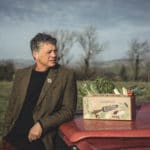The soil is drying fast – and our valley is a frenzy of activity. Farmers are muck-spreading, ploughing, and sowing maize, cereals, grass, and of course, veg. Despite some long working days (and a few nights), optimism has returned. Finally, we can do what we are here to do. Farmers cling to the delusion of hard-nosed, data-driven decision making – but deep down, ours is an emotion-driven business, with highs and lows amplified by the isolation. A rationalist would have quit years ago.
Where we have cleared the final crop in a rotation of vegetables, our fields are being returned to restorative ‘herbal leys’. These will feed the dairy cows of my brother Oliver and sister Louise, build the soil’s fertility, and give its structure, invertebrates, and microbes a chance to recover. Oliver has become an expert at establishing largely weed-free leys without using herbicides, by sowing a complex mixture. This includes a ‘nurse’ crop of annual cereals (barley or triticale) mixed with lupins. He also plants grass (up to ten species), clover (up to five species), chicory, and other herbs. These smaller-seeded plants are slower to establish, and benefit from the shade of the larger-seeded, faster-growing cereals. In summer, the cereals mature, and the mixture is cut as one whole, green crop – making silage to feed the cows in winter. With the vigorous cereals gone, the grass and clover take over for three to six years, replenishing the soil until we return to grow more veg.
This diverse mixture has been the basis of a good farm rotation for 200 years. Vegetables, which require fields to be cultivated regularly, are great for controlling persistent, perennial weeds like couch grass, docks, and creeping buttercup. The tightly interwoven, highly competitive, and frequently grazed herbal leys leave no chance for the annual weeds (chickweed, fat hen, cleavers, etc.) which plague us during the veg part of the rotation. Vegetables are weak surface rooters – whereas triticale, some grasses, and chicory stretch their roots down two metres, bringing nutrients that have been leached out of the topsoil back up into circulation.
The reward of husbanding our soil, crops, and hedges is huge, but largely emotional. With funds exhausted by a wet winter, the commercial reality of prices that leave no room for crop losses will be too much for some farmers. But for now, at least, many of us are smiling.
















0 Comments